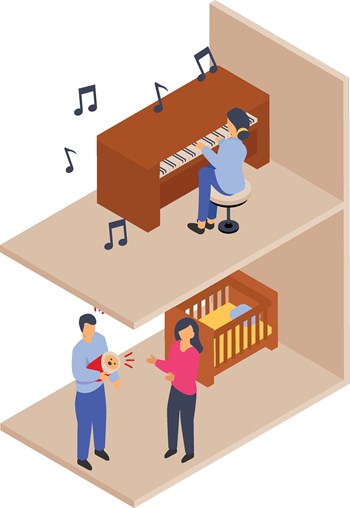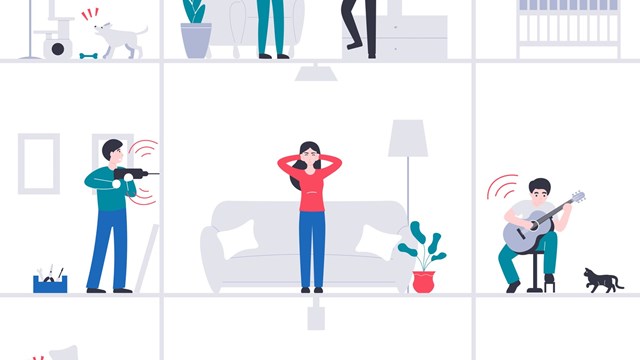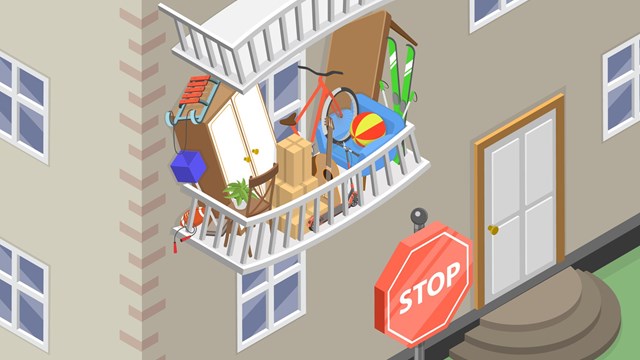
Q. I’ve lived in a pre-war NYC studio co-op for almost 40 years. While the apartment walls are well insulated against adjacent apartment sound, the floor and subfloor, being constructed entirely of wood, barely provide any sound insulation from the apartment above.
Two years ago the shareholder above me installed a grand piano to practice on. The sound resonates into my studio as if it’s actually in my studio! The piano practicing goes on for hours every evening until 10 p.m. (when the house rules say it must end), seven nights a week, 365 days a year.
I’ve asked my board to curtail this person’s playing by having him stop at a reasonable hour, such as 8:00 p.m., but they have refused to do so. Even though there is a thin carpet under the piano, the sound clearly resonates through the piano legs directly to the floor and into my studio. Additionally, I have requested that special piano leg insulation be required, but here again, the board has refused to enforce it. As well, all attempts to resolve the issue on a personal level have been to no avail.
The resonance of the piano sound is most disturbing and interferes with evening activities, such as watching TV, reading, or even playing my own music at a reasonable level. I am forced to wear noise-canceling headphones to avoid having to hear the hours of piano practice.
Is this person’s nightly piano practice in violation of my warranty of habitability? If not, is there anything that can be done to curtail the disturbing practicing?
—Exhausted
A. Attorney Bruce Cholst of New York City law firm Herrick Feinstein replies, “Based on the facts related by ‘Exhausted,’ I believe the co-op has breached its warranty of habitability by failing to intervene to abate the unreasonable noise condition posed by her neighbor’s incessant piano playing. I also believe that ‘Exhausted’ has direct legal recourse against the neighbor for injunctive relief restricting the piano playing as its magnitude constitutes a ‘private nuisance.’
“Under the statutory warranty of habitability, residential landlords, including co-op boards, have the legal obligation to provide their tenants with a safe apartment which meets applicable health standards, is ‘fit for human habitation,’ and offers conditions consistent with the apartment’s intended use as a dwelling unit. The concept behind this legal obligation is that a landlord receives its agreed upon rent (maintenance) from its tenant and is therefore required to perform the services and deliver the apartment conditions for which the tenant has bargained. Those conditions include a premises which meets basic health and safety standards. The courts have ruled that constantly pulsating noise of the nature described by ‘Exhausted,’ which interfere with a tenant’s use of his or her apartment for basic residential activity such as watching television or reading, is violative of basic health and safety standards and deprives the tenant of its bargain with respect to the apartment. Courts have also ruled that when this type of health hazard and interference with a tenant’s use and enjoyment of his apartment is caused by the conduct of a neighboring tenant, and the landlord has the power to curtail that offending tenant’s activity through legal action or otherwise and if it nonetheless fails to take effective action to abate the condition, it has breached its warranty of habitability to the aggrieved tenant. Thus, the co-op’s failure to intervene to abate the offending condition constitutes a breach of its warranty of habitability to the aggrieved tenant.
“Lack of sound insulation in the building’s flooring due to its preexisting wood construction is irrelevant to the co-op’s obligation to fulfill its warranty of habitability. The board is nonetheless required to take effective ameliorative action, which, as ‘Exhausted’ notes, could entail restrictions on the number of hours the neighbor plays his music, the duration of each practice session, or requiring sound attenuation measures, as well as litigation.
“‘Exhausted’ also has direct legal recourse against the offending neighbor in the nature of injunctive relief. Every landowner, including the owner of a co-op unit, has the duty to avoid using his property in a manner which violates neighbors’ rights. His failure to do so constitutes a ‘private nuisance.’ ‘Exhausted’ could sue on this theory in the state Supreme Court to seek a court order restricting the neighbor’s piano playing.
“Finally, even though conciliation efforts have proved fruitless to date, either ‘Exhausted’ or the co-op could seek to initiate mediation efforts with respect to this dispute.”









Comments
Leave a Comment